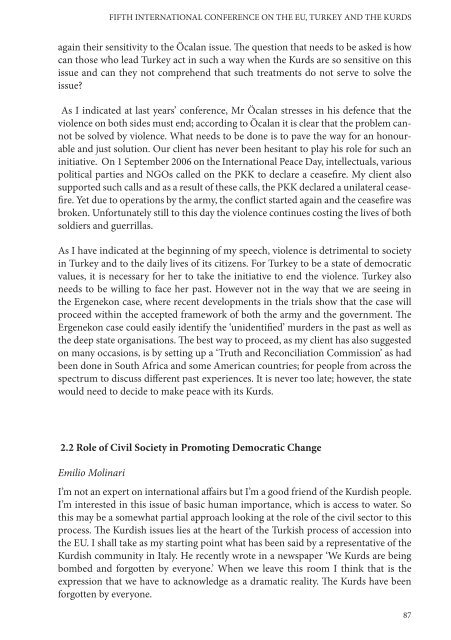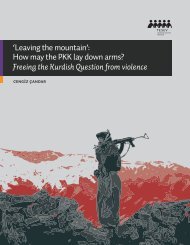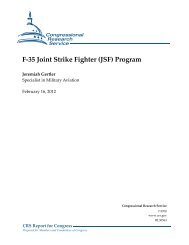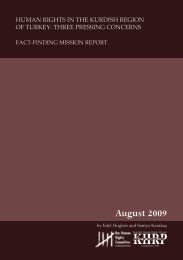FIFTH INTERNATIONAL CONFERENCE ON THE EU TURKEY AND THE KURDS
fifth international conference on the eu, turkey and the kurds
fifth international conference on the eu, turkey and the kurds
You also want an ePaper? Increase the reach of your titles
YUMPU automatically turns print PDFs into web optimized ePapers that Google loves.
<strong>FIFTH</strong> <strong>INTERNATI<strong>ON</strong>AL</strong> <strong>C<strong>ON</strong>FERENCE</strong> <strong>ON</strong> <strong>THE</strong> <strong>EU</strong>, <strong>TURKEY</strong> <strong>AND</strong> <strong>THE</strong> <strong>KURDS</strong><br />
again their sensitivity to the Öcalan issue. The question that needs to be asked is how<br />
can those who lead Turkey act in such a way when the Kurds are so sensitive on this<br />
issue and can they not comprehend that such treatments do not serve to solve the<br />
issue?<br />
As I indicated at last years’ conference, Mr Öcalan stresses in his defence that the<br />
violence on both sides must end; according to Öcalan it is clear that the problem cannot<br />
be solved by violence. What needs to be done is to pave the way for an honourable<br />
and just solution. Our client has never been hesitant to play his role for such an<br />
initiative. On 1 September 2006 on the International Peace Day, intellectuals, various<br />
political parties and NGOs called on the PKK to declare a ceasefire. My client also<br />
supported such calls and as a result of these calls, the PKK declared a unilateral ceasefire.<br />
Yet due to operations by the army, the conflict started again and the ceasefire was<br />
broken. Unfortunately still to this day the violence continues costing the lives of both<br />
soldiers and guerrillas.<br />
As I have indicated at the beginning of my speech, violence is detrimental to society<br />
in Turkey and to the daily lives of its citizens. For Turkey to be a state of democratic<br />
values, it is necessary for her to take the initiative to end the violence. Turkey also<br />
needs to be willing to face her past. However not in the way that we are seeing in<br />
the Ergenekon case, where recent developments in the trials show that the case will<br />
proceed within the accepted framework of both the army and the government. The<br />
Ergenekon case could easily identify the ‘unidentified’ murders in the past as well as<br />
the deep state organisations. The best way to proceed, as my client has also suggested<br />
on many occasions, is by setting up a ‘Truth and Reconciliation Commission’ as had<br />
been done in South Africa and some American countries; for people from across the<br />
spectrum to discuss different past experiences. It is never too late; however, the state<br />
would need to decide to make peace with its Kurds.<br />
2.2 Role of Civil Society in Promoting Democratic Change<br />
Emilio Molinari<br />
I’m not an expert on international affairs but I’m a good friend of the Kurdish people.<br />
I’m interested in this issue of basic human importance, which is access to water. So<br />
this may be a somewhat partial approach looking at the role of the civil sector to this<br />
process. The Kurdish issues lies at the heart of the Turkish process of accession into<br />
the <strong>EU</strong>. I shall take as my starting point what has been said by a representative of the<br />
Kurdish community in Italy. He recently wrote in a newspaper ‘We Kurds are being<br />
bombed and forgotten by everyone.’ When we leave this room I think that is the<br />
expression that we have to acknowledge as a dramatic reality. The Kurds have been<br />
forgotten by everyone.<br />
87





